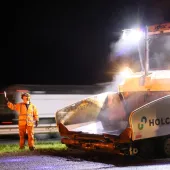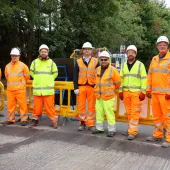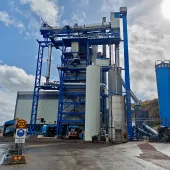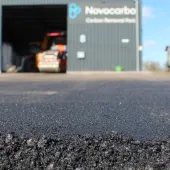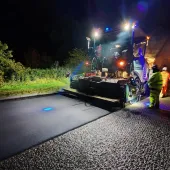Ground Tyre Rubber Paving Pellets

First published in the January 2014 issue of Quarry Management as GTR Paving Pellets
Billian UK explain how advances in rubber-modified bitumen will make asphalt manufacturing more sustainable
Asphalt made using bitumen modified with rubber concentrate from ground recycled tyres could be used to create roads that last longer and require less maintenance. Rubber-modified bitumen has a strong track record across Europe and the US and is acknowledged by highway engineering experts as a method of providing high performance in asphalt. And there is no disputing the fact that it makes good sense. Reusing ground tyre rubber from recycled tyres as a bitumen modifier not only reduces the environmental impact of asphalt, both socially and economically, but also has the potential to significantly reduce asphalt production costs by negating the need for costly polymer-modified bitumen (PMB) and the highly energy-intensive heated tanks used for storing hot liquid PMB.
Protecting the environment is one of the burning issues within the road construction and maintenance industry, hence the search for new bitumen additives to replace diminishing petrochemical-based products and make use of waste rather than consuming raw materials. Of course, innovation and collaboration are needed to drive sustainability plans forward, and both are needed to successfully exploit new ideas to obtain competitive advantage – this is integral to developing new products for the market, new processes and new ways of working. Without the necessary technology, meeting the needs of industry is a major challenge.
Advances in tyre recycling technology, for example, are meeting the needs of emerging industries, and advances in rubber-modified bitumen technology, particularly in pelletizing high-concentrate ground tyre rubber (GTR) for easy delivery into the asphalt mix, are meeting growing demand for simple yet highly sustainable methods of manufacturing performance asphalts.
Of course, there is nothing new about using recycled tyre rubber in road surfacing – this has been happening for more than 50 years, but the key to unlocking the full potential of so-called rubberized asphalt is the technology, ie ‘how to get’ the recycled tyre rubber into the asphalt.
Billian UK, founded by Bill Bolsover CBE, former chief executive officer of Aggregate Industries and current chairman of the Strategic Forum for Construction, are using innovative technology, first developed in the US, to improve traditional ways of modifying asphalt. The company says its new product, called GTR Paving Pellets, will help to make better-quality roads more sustainable and more widely available.
The Billian technology relies on a simple yet highly effective process of harnessing the resilient properties of rubber in small easy-to-use pellets, about 10mm in size. The pellets are designed to act as a delivery mechanism for the rubber concentrate, which begins life as recycled ground tyre rubber – the GTR in the product – before being blended with bitumen and then converted into pellets.
Because the pellets are manufactured at a single processing facility in Sheffield and then transported to the asphalt plant at ambient temperature, all of the issues concerning storage stability and degradation associated with hot bulk liquid modified bitumen are removed.
Billian claim the technology will allow all asphalt plants to make modified higher-performance asphalt, and the versatility of
this technology will offer opportunities to increase profit margins, expand the use of performance asphalts in the UK, improve efficiency and self-promote a ‘green image’ for recycling, energy savings and environmental stewardship.
‘Because of the unique physical properties of the GTR Paving Pellets, there are many more options for using them than for using conventional polymer-modified bitumen,’ explained Billian UK’s general manager, Gareth Evans.
Bitumen is normally transported in a heated road tanker and the shipping distances are dependent upon the ability to maintain heat or to reheat the material such that it can be pumped. GTR Paving Pellets are transported in bulk solid form at ambient temperature in quantities to suit the customer, from 5kg low melt to 1-tonne bulk bags, before being added directly into the asphalt mix. Unlike conventional paving-grade or modified bitumen, the pellets do not need to be heated before use. Low-temperature storage also prevents any degradation of the product whilst in storage for extended periods.
‘Our product allows all asphalt plants to make almost any type of asphalt they like, in any quantity, at any time, with no waste and no need for energy-intensive heated storage tankers,’ said Mr Evans. ‘They can make whatever they want by simply dosing the asphalt mix with the GTR Paving Pellets to make superior performing asphalt.
‘Anything we can do to make roads last longer is a good thing. We have known how to do this for years. GTR Paving Pellets simply help to make it more achievable. Many new roads will last longer as a result, saving the Government millions of pounds and thousands of tonnes of CO2 in the process.
‘There is currently a massive demand in the UK for better-quality, more durable roads. One in five of our roads is in poor condition, which means they have less than five years of life remaining – currently a £10.5 billion problem.
‘The UK road construction and maintenance market is projected to be worth £28 billion over the next five years and represents a significant opportunity for GTR Paving Pellets technology.’
- Subscribe to Quarry Management, the monthly journal for the mineral products industry, to read articles before they appear on Agg-Net


